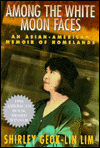
Among the
White Moon Faces: An Asian-American Memoir of Homelands
|
|
bn.com Price: $10.36
Retail Price: $12.95
You Save: $2.59 (20%)
In-Stock: Ships within 24 hours
Format: Paperback, 232pp.
ISBN: 1558611797
Publisher: Feminist Press at The City University
of New York
Pub. Date: September 1997
Edition Desc: REPRINT
Other Formats: Hardcover
|
About the
book
Synopsis
This is an autobiography by the poet, fiction writer, and professor ofEnglish
and women's studies. The author's "analysis of class, gender, and ethnic
issues is {presented within} . . . stories about growing up in a large
family in relative poverty, attending a British-run Malaysian convent school
as a child, moving on to graduate school and an academic career in the
US, and finally creating her own multiethnic family." (Choice)
From The Publisher
Shirley Geok-lin Lim's memoir is a courageously frank and deeply affecting
account of a Malaysian girlhood and of the making of an Asian-American
woman. With insight, candor, and grace, Lim lays bare the material poverty
and family violence of her childhood in colonized Malaysia after her father's
business fails and her mother abandons the family, leaving Shirley to travel
the road toward womanhood alone. Her struggles to fashion a meaningful
life that will include professional achievement and a self-determined sexuality
inflect her journey across and through cultural, political, and geographic
borders. Throughout this extraordinary multi-cultural journey, Lim is sustained
by her "warrior" spirit. Very gradually, and often painfully, she moves
from a numbing alienation as a dislocated Asian woman to a new sense of
identity as an Asian-American woman: professor, wife, mother of a son she
is determined to raise as American, and, above all, impassioned writer.
Reviews
From Brinda Bose - World Literature Today
Lim's courageous stories of her early life . . . are told with the right
amount of detachment that never allows her to wallow in self-pity. Instead
there is warmth, and humor, and a great skill in realistically recreating
a world long lost. It is only in the later sections of the book, when Lim
has obviously extricated herself heroically from the debilitating circumstances
of her childhood, that her continued sense of dislocation and dispossession
in the New World of America begins to sound like an indulgent angst. .
. . However, at the end of this extremely well-written memoir, we are indeed
happy to learn that the cathartic regurgitation of her Malaysian stories
has laid to rest the ghosts of Lim's past, and that the reconstruction
of her fifty-year life of singular achievements appears finally to have
convinced the writer that she may yet find her place in the sun that shines
upon her adopted homeland.
From Booknews
Poet Lim's memoir describes her childhood in Malaysia, the post- colonial
days of her university youth, and her eventual migration to the United
States. In this cultural document of both the US and Malaysia, her poetic
mastery makes the tale vivid by its evocative language and attention to
emotional detail, somewhat mitigating the often characteristic triteness
of immigrant stories, particularly ones like this that rely heavily on
feminist and psychological ideologies. Annotation c. Book News, Inc., Portland,
OR (booknews.com)
From Library Journal
In this autobiography of her wild and impoverished Malayan childhood and
eventual emigration to America, critic and theorist Lim (Reading the Literature
of Asian Americans, LJ 1/93) uses the same gender and ethnic issues discussed
in her critical appraisals to delineate her "two lives." She describes
the Third World poverty of her Chinese minority family, "the cultural imperialism
of British colonial education," Chinese patriarchy and ambition, disappoinments
in Malayan home rule, and the isolation of Asian graduate students in America.
She offers both flattering and unflattering glimpses of American life as
seen through immigrant eyes. Like many successful immigrants, Lim is a
survivor with hard-won success. After years of struggle, she has gained
prominence in the growing field of Asian American literature. Her revealing
self-portrait is recommended for academic libraries and Asian American
collections.-Margaret W. Norton, J. Sterling Morton H.S., West Berwyn,
Ill.
From Patricia Abe - Ms.
A good memoir can read like a novel that's hard to put down; it transports
the reader to another time and place, with fascinating characters and a
suspense that keeps the pages turning. So it is with Shirley Geok-lin Lim's
account. . . . An ethnic Chinese born into a Malayan society in which girls
were 'unnecessary as individuals (and) concern(ed) nobody, unlike sons,'
Lim fared better than many of her peers in having a father who valued an
educated daughter, if only so that he could reap her future earnings. But
the family's routinelife quickly unraveled. . . . Despite her privations--or
perhaps because of them--Lim found a new world in poetry and literature.
. . . Lim's bittersweet and at times comic adventures take her to Boston;
Brooklyn; Westchester, New York; and Santa Barbara. She recounts her journey
with a poet's eye for detail and a storyteller's gift for narrative.
From J. Tharp - Choice
Neither Maxine Hong Kingston's Woman Warrior (1978) nor Trinh T. Minh-ha's
Woman, Native, Other (1989) quite approaches the autobiographical clarity
ofLim's book. . . . Rich prose and accounts of compelling experiences make
thisbook a pleasure to read. All collections.
From Publisher's Weekly - Publishers Weekly
Lim's autobiography certainly qualifies for a place in Feminist Press's
Cross-Cultural Memoir Series. Her father, a devotee of Western movies,
named her Shirley (for her dimples, he said); the convent school sisters
gave her the names Agnes and Jennifer; while Geok or "Jade" was assigned
by her grandfather to all the female children, "a name intended to humble,
to make a child common." Born in 1944 during the Japanese occupation of
Malaysia, Lim was the only girl in a family of five boys. For her, academics
represented a way to distinguish herself and earn her father's love. Her
mother deserted the family when she was eight, leaving Lim increasingly
rebellious and determined to escape. And she succeeded: Scholarship to
the University of Malaysia was followed by a Fulbright to Brandeis, and
finally an academic career and family in America. She's a sharp, even harsh
commentator with a vivid memory for slights. But she's also tough with
herself, with her acquiescence to her father's wishes, to a lover's manipulation,
to a professor's appropriation of her thesis. She also ponders her inability
to reconcile her sympathy with her Puerto Rican students and her resentment
of her Puerto Rican neighbors in Brooklyn. The first woman and the first
Asian to win the Commonwealth Prize for her book of poetry, Crossing the
Peninsula, Lim's descriptions are both lyrical and precise whether they
are of the heat, bougainvillea and crowds of her home in Malacca or the
wintery climate, the packaged food, the self-conscious bohemianism of New
England. Photos not seen by PW. (Aug.)
Reviews
Summary Autobiography
More

Home Autobiography
Biography Picture
Gallery Bibliography
Malaysia Critiques
Literary Works Acknowledgements


